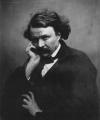بابک جان
فرمایش شما در مورد فوتوشاپ درست است. در تایید و ادامه صحبت شما باید بگویم که به همین صورت به هیچ عکس بسیار شارپی که از شارپی مثل تیغ ژیلت است هم به صرف شارپ بودن جایزه عکاسی نمیدهند.
الان مشکلی که دامن گیر بسیاری شده است این داستان شارپ بودن و داشتن حداکثر ممکن جزییات در عکس است. بسیاری از عکسهای معروف و با ارزش با لنزهای نه چندان شارپ و با جزییات معمولی ثبت شده اند چون عکس به عنوان یک کل دیده شده و نه مجموعه ای از اجزای ریز درون آن.
داستان عکاسی حیات وحش داستان دیگری است که اگر کسی میخواهد به صورت جدی وارد آن بشود باید بهای ابزارهای آن را هم بدهد. اما عکس های مستند اجتماعی یا لند اسکیپ را میشود با لنزهای بسیار معمولی گرفت.
نمایش نتایج : از شماره 2,231 تا 2,240 , از مجموع 6884
موضوع: شايعات يا واقعيات
-
Saturday 19 March 2011, 13:36 #2231

-
Saturday 19 March 2011, 21:26 #2232

-
Saturday 19 March 2011, 23:28 #2233

دقیقا ً متوجه منظورتان نشدم , ولی شکل شماتیک دوم هم یک بدنه حرفه ای نیکون است که احتمالاً فلاش ندارد ... و بعید هم میدانم که داشتن فلاش سرخود در صورت حفظ سیلینگ بدنه از حرفه ای بودن آن کم کند.
و سنسور نمایش داده شده در شکل هم تقریبا ً همانجایی است که سنسور وایت بالانس D2x قرار داشته :
d2x-front.jpg
-
Sunday 20 March 2011, 00:29 #2234

برداشت من از مطلب اول شما این بود که می گید این قابلیت جدید فقط روی حرفه ای ها خواهد بود؛ و منظور من این بود که چون دوربین های حرفه ای فلاش سر خود ندارن و تو تصاویر یه فلاش سرخود هم وجود داره، پس احتمالا هم برای حرفه ای ها و هم برای غر حرفه ای ها ثبت شده...
(یعنی توضیحاتی که لازم بوده رو روی شماتیک دوربین حرفه ای شماره گذاری کردن و اون شماتیک فلاش رو هم برای مشخص کردن قسمت شماره ۲۹ که تو مدل های غیر حرفه ای جاش با مدل حرفه ای فرق داره اضافه کردن.)
-
Sunday 20 March 2011, 00:30 #2235

سلام
Canon doesn't need a compact system camera
ممکن است لینک در دسترس نباشد متن کامل از لینک مورد نظر...
Canon doesn't need to introduce a mirrorless compact system camera (CSC), according to the head of consumer imaging in Europe, as the company does not have a problem selling its existing compact and DSLR products. In an interview with Amateur Photographer, Rainer Fuehres said that compact system cameras have been introduced by manufacturers that find it difficult to compete in the digital SLR market. Not ruling out the possibility that Canon will enter this area, Rainer stressed that if it did the reason would not be because Canon felt it had to.
'The idea of the compact system camera is nothing to do with whether the camera has a mirror or not, but about creating a small and more portable system. If Canon does take part I hope we won't introduce just a me-too product, but we'll use the opportunity to do something different.' Rainer said. 'For Canon it would be about connectivity and providing high image quality in a small form'. The manufacturers that have introduced micro Four Thirds and mirrorless systems have been those that have failed to make a success of their mainstream digital SLR offerings, according to Rainer. Indeed, when Samsung first mentioned its then forthcoming NX system to AP in 2008 Samsung Techwin Executive Vice President Byung Woo Lee stated that the move into a new area would come because the company's GX series of DSLRs could not compete with Nikon and Canon's models.
Canon has consistently refused to comment on its position on the new compact system camera, and when asked whether the company would enter the mirrorless market or concentrate on making its EOS DSLR series smaller Rainer would not say. The two and a half year-old CSC market is growing, with Panasonic leading the way with its Lumix G series cameras. While these smaller camera systems have been popular in Asia, the UK and some other European countries, they have failed to make much impact in the enormous and essential American market. Until Canon, and Nikon, can see that the market is truly global the introduction of a compact mirrorless system will be a risk that these companies perhaps do not have to take.
Canon and Nikon, as DSLR market leaders by a long stretch, do not have to follow the routes taken by Panasonic, Samsung, Olympus and Sony, and can use the opportunity to produce a completely new product form. Following the attention that Fuji's X100 has received it isn't inconceivable that a retro rangefinder system, designed around 1959 Canon P or 1965 7S rangefinder systems could be on the cards. We will just have to wait and see, but for now Canon will not rule anything in, or anything out.
کد:http://www.amateurphotographer.co.uk/news/canon_doesnt_need_compact_system_camera_news_306394.html

-
Wednesday 30 March 2011, 03:21 #2236

کانن پخش لنزهای فیش-آی و 300 و 400 نسخه جدید رو دوباره به تاخیر انداخت...
Google Translated Link in Japanese
_________________________
این رو گفتم که صحبت از لنزها بشه که اینو بگم! :
توی ویکیپدیا گشتی میزدم که به این نکته برخوردم...
On the back of Canon lenses is a six-digit code, which indicates where the lens was manufactured and when.
Example of a code "UV1212"
The first letter 'U' represents the factory that made the lens. Three possible first letters are:
U = Utsunomiya
F = Fukushima
O = Ōita
یکی از سه کارخونهی لنزسازی کانن ژاپن توی فوکوشیما است!
احتمالا تا چند سال دیگه همهی کاننی ها یا از سرطان میمیرند؛ یا موقع خرید لنز یه شمارشگر گایگر آویزون خودشون میکنن میرند مغازه!
توی همین راستا، لینک پایین گزارش خسارات وارده است به واحدهای فعال کانن در ژاپن.
Canon's Damage Report on March 13 (Updated on March 15)1
همینطور لینک پایین که از برنامه هاشون برای آغازبه کار دوبارهشون میگه...و اینکه برنامهی قطعی ای در دستور کار نیست.
همینطور به دستور نخست وزیر ژاپن، اونها هم مجبورند در برق صرفه جویی کنند و منطقا این یعنی کاهش محصول (کارخانهی فوکوشیما که دیگه باید تا الان تعطیل شده باشه. یعنی قطع تولید به میزان یک سوم. در بهترین شرایط البته.
Canon launches recovery measures following major earthquake in Japan
گرچه واقعا این اخبار در برابر مشکلات واقعی که مردم ژاپن در حال دست و پنجه نرم کردن باهاشون هستند، ذرهای اهمیت نداره.
.
پ.ن. از نیکون چه خبر؟Owning: Canon EOS 7D + EF-S 15-85 IS USM + EF-S 10-22 USM + Manfrotto (Bogen) 055CXPRO4 + Manfrotto 322RC2 Ballhead + Lowepro Primus AW Black + Tamrac Aero SpeedPack85
-
Wednesday 30 March 2011, 03:37 #2237كاربر فعال


- تاریخ عضویت
- February 2011
- محل سکونت
- سـرزمین اهـورا
- نوشته ها
- 782
- تشکر شده
- 2925
- تشکر کرده
- 4662

درود بر شما ، مطلب جالب بود .
یه چند وقتیه که با هر مغازه داری صحبت میکنم (فروشگاه دوربین) از افزایش احتمالی قیمت دوربین به بهانه ی ژاپن صحبت میکنه . به نظرم وقتی کارخانه های عظیم خودروسازی میتونن تا یه هفته تولیدشون رو به میزان قبلی برگردونن ، شرکت های دوربین سازی هم میتونن . تازه باید توجه کرد که هر شرکت به مقدار زیادی از هر مدل دوربین در انبار خودش داره و تا مدتی میتونه دنیا رو تامین کنه . ولی بر خلاف همه ی این موارد ، پیش بینی میکنم که بازاریان ما این صحبت ها رو نشنیده بگیرن و بی دلیل ، قیمت را به ضرر مشتری بالا ببرن .
-
Wednesday 30 March 2011, 12:31 #2238

گذشته از اینکه فروشنده های جمهوری چی میگن، هر سال طبق روال در این زمان(اوایل سال) وارد کننده ها منتظر اتفاقات جدید مثل تعرفه گمرکی و نرخ ارز و سخنرانی ... میشوند و از طرفی خود به خود با آمادگی ذهنی که از کودکی همه داریم برای تغییر قیمت در سال جدید مشتری کاملا آماده است، پس یه تغییر جزئی به قول بچه ها رواله.
ولی با پیش اومدن مشکل زلزله در ژاپن حتی اگه مشکلی هم نباشه بهانه خوبی برای وارد کننده ها یا حداقل فروشنده ها به دست اومده دیروز بنده یه سر زدم دوربین 7D کم شده و قیمتهایی که میگن اصلا قابل مقایسه با چند روز قبل از عید نیست.
با این مطلب هم کاملا موافقم و امیدوارم این فاجعه انسانی مخصوصا قضیه نیروگاه هر چه زودتر ختم به خیر بشه.گرچه واقعا این اخبار در برابر مشکلات واقعی که مردم ژاپن در حال دست و پنجه نرم کردن باهاشون هستند، ذرهای اهمیت نداره.
-
Friday 1 April 2011, 02:25 #2239Forum Moderator


- تاریخ عضویت
- December 2009
- محل سکونت
- گيلان و مازندران
- نوشته ها
- 1,189
- تشکر شده
- 11839
- تشکر کرده
- 12611
 Another picture of the Nikon D5100
Another picture of the Nikon D5100
سلام
میدونم تکراریه و بارها عنوان شده که دی 5100 نیکون در راهه! ولی اینجوری هیجانش بیشتره
احتمالاً اواخر همین ماه سرو کلش پیدا میشه
همونطور که از عکس زیر مشخصه لولای مانیتور چرخان در کنار داره و مثل دی 5000 نیست

کد:http://nikonrumors.com/2011/03/31/another-picture-of-the-nikon-d5100.aspx
ویرایش توسط Mehdi Rojaie : Friday 1 April 2011 در ساعت 02:39
مهدی روجایی

-
Saturday 2 April 2011, 20:37 #2240كاربر ويژه


- تاریخ عضویت
- January 2006
- محل سکونت
- Tehran & Karaj
- نوشته ها
- 7,444
- تشکر شده
- 26237
- تشکر کرده
- 14101


مثل اینکه همین روز ها A35 سونی معرفی خواهد شد.
به بنر بالای صفحه توجه کنید.
http://www.sony.nl/hub/dslrکاوه قبادیExposure.ir
I am a visual man. I watch, watch, watch. I understand things through my eyes. Henri Cartier-Bresson

 33618تشکر
33618تشکر LinkBack URL
LinkBack URL About LinkBacks
About LinkBacks

 پاسخ با نقل قول
پاسخ با نقل قول